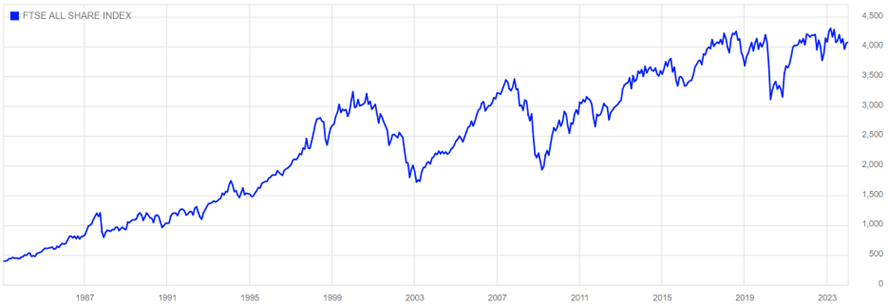As we reach the end of 2023, financial experts and organisations are compiling their forecasts for the year ahead. After a tumultuous few years for markets and the wider economy, they’ve got their work cut out for them.
Investment goes hand-in-hand with risk, and forecasts can help to inform investment choices, about asset allocation, say. But too much prediction, at the expense of preparation, could mean that you’re taking too much (or even too little) risk.
Forecasting is at least partly speculative, and it can be subjective too. We’re only human and biases can creep in.
But a thorough understanding of your goals and risk profile – alongside a steadfast, long-term focus – can dispense with the need for prediction. Good preparation can help you achieve a successful investment that aligns with the level of risk you are willing to take.
Here’s how.
Forecasting can be difficult but the general trend of the markets is upward
Last month, you might’ve read ‘5 simple ways expert advice can help you stay calm during stock market volatility’ in which we stated that markets generally rise. We included a graph very similar to the one below showing the FTSE All-Share Index over the last 40 years.

Source: London Stock Exchange
Despite obvious dips during the 2003 Iraq War, the 2008 global financial crisis, and the coronavirus pandemic in 2020, the upward trend is clear.
It’s why we advise long-term investments – to allow you to take advantage of this general rise while riding out periods of short-term volatility.
While this might mean that we’re “forecasting” a continued rise in the markets, it’s an evidence-based prediction that comes from research and an understanding of the markets. This is very different to chasing trends or looking to time the market.
Top investment experts advise against trying to time the market
Investment expert and so-called “Oracle of Omaha” Warren Buffett has several things to say about trying to time the market and the importance of staying invested.
One of the US billionaire’s most repeated quotes is, “If you aren’t thinking about owning a stock for 10 years, don’t even think about owning it for 10 minutes.”
He also looked upon the stock market as “a device to transfer money from the impatient to the patient”.
This is important for several reasons. When times are hard it can be tempting to ditch your investments. You might be considering this now, as markets remain volatile and cash savings rates rise.
But making an emotional, knee-jerk decision can turn a paper loss into a real one. It also means your money won’t be invested when the markets recover, leading to huge potential opportunity loss. A lower fund also fails to take full advantage of the effects of compound growth.
Vanguard co-founder Jack Bogle puts it this way:
“The idea that a bell rings to signal when to get into or out of the stock market is simply not credible. After nearly 50 years in this business, I don’t know anybody who has done it successfully and consistently. I don’t even know anybody who knows anybody who has.”
Our ability to forecast and time the markets can be affected by in-built subconscious biases
Predicting the future isn’t easy. One reason why trying to make predictions to time the markets is so tricky is because of the subconscious biases we carry as human beings.
Here are just a few you might be susceptible to and why they can be so damaging:
- Herd mentality or trend-chasing bias – Your financial plan is unique to you so, while it can be comforting to follow the crowd, remember that what’s right for someone else might not be right for you.
- Confirmation bias – If you buy the newspaper that best aligns with your political views you’ll understand confirmation bias. It’s the desire to seek out information that backs up preconceived ideas. It can lead your investments awry if you fail to take in the whole picture and dismiss the evidence in front of you.
- Overconfidence – You might consider yourself an investment novice but your subconscious likely thinks differently. Within the echo chamber of our own confirmation bias, your subconscious can decide it knows best, leading to a dangerous overconfidence.
Even expert forecasters can be subject to biases. It’s one reason why predicting what the markets – and so our investments – might do next is so difficult. Rather than trying to predict, it’s much better to prepare well, and then sit back and wait.
Stay patient, ignore the noise, and focus on your long-term investment goals
A financial plan aligned to your risk profile might not get you to your goal in the fastest possible time. But it will give you the best chance of achieving your goal in your given time frame while taking the least possible amount of risk.
This option allows you to sit back and relax, ignoring the background noise of global or national economic volatility.
At Murphy Wealth, we’ll keep an eye on your investments for you and keep you updated through your annual review. This means we can ensure your portfolio, asset allocation, and risk strategy still align with your goals and recommend any changes if needed.
You’ll have peace of mind that your money is being looked after without having to follow the latest forecasts and chase the newest trends.
Get in touch
If you’d like help managing your long-term investment, or you’d just like reassurance that you’re still on track, get in touch now. Please email us at beyourself@murphywealth.co.uk or give us a call on 0141 221 5353.
Please note
The value of your investments (and any income from them) can go down as well as up and you may not get back the full amount you invested. Past performance is not a reliable indicator of future performance. Investments should be considered over the longer term and should fit in with your overall attitude to risk and financial circumstances.


 Production
Production